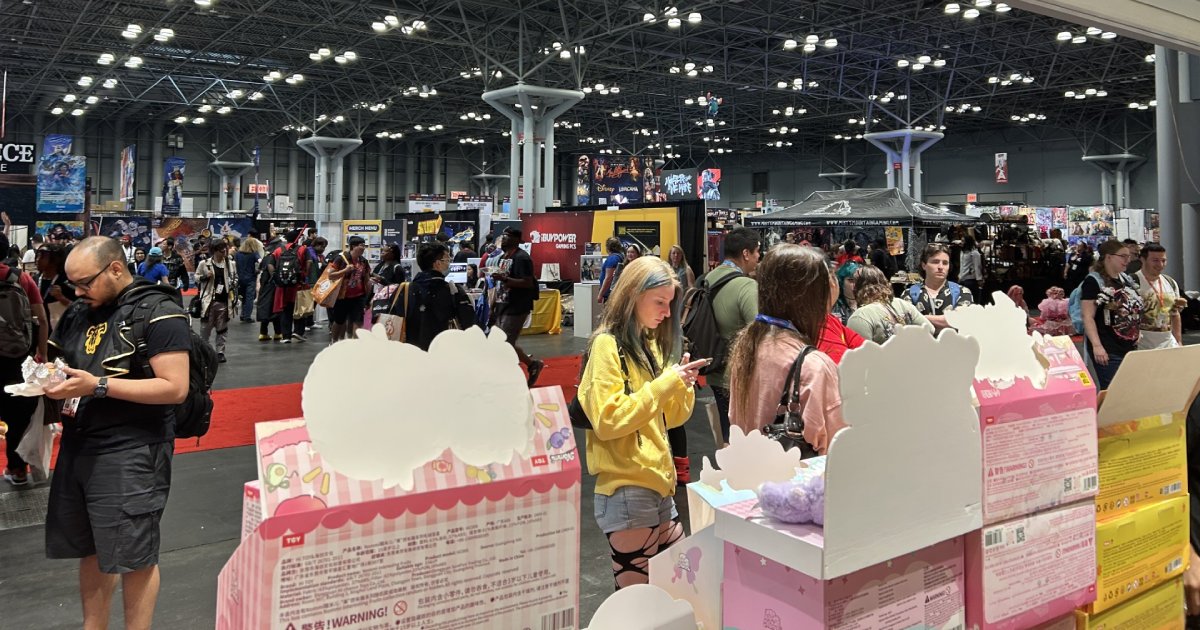Manga Spreads Across Content Categories

By Mark Seavy
The pace at which manga is being adapted for anime series, video games, and films is accelerating and with that come new opportunities for licensing.
That increased speed was evident at the recent Anime NYC show in New York where manga adapted for anime increasingly had a licensing program or plans for it already in place ahead of the content launch.
Rooster Fighter, for example, was launched by author Shu Sakuratani in 2020 on the Complex website with the English version published and adapted for anime by Viz Media. The anime, which debuted at the show, will be released in spring 2026. In advance, Viz has a licensing program in place featuring partners including Mad Engine (water bottles, t-shirts). Viz Media also sourced its own t-shirts to sell at the show, said Laura Takaragawa, VP of Consumer Products at Viz.
Myfutprint, meanwhile, which landed a publishing agreement with The Quarto Group under the Rockport Publishers imprint in 2021, released its top-seller Clock Striker two years later and has a licensing deal with Bioworld for apparel based on the Philomena character. Myfutprint markets manga from a diverse array of authors, including Nigeria’s Odunze Oguguo (Apple Black), a major departure in a business dominated by Japanese publishers. And digital publisher Komodo Co., which launched its Niuhi platform for manga earlier this year, has so far gained 60 titles from 20-30 independent creators, including its first original, Moon Ciders from creator “Tali” Takafumi. Komodo also will represent the creators for anime and licensing.
“Development is moving faster now because there are more sophisticated tools across all the mediums,” said Ricky Yu, Co-Founder and CEO of Komodo. “Because the gap is closing and because, depending on the scale of what you are trying build, it is a little bit more accessible to develop and get the word out. In some cases, it can be months [to create and publish manga] that is small and tight in scale. That’s because there is a much more educated pool of talent and it’s much easier to find it because the developer community has grown.”
Digital publishing has sped the spread of manga across formats. Author and illustrator Yukinobu Tatsu released Dan Da Dan as a web manga series in 2021. Tatsu has since had 20 volumes published, along with a second season of anime released by production company Science Sanu in July and a licensing agreement with Funko.
Film distributor GKids also recently signed an agreement for the theatrical and home entertainment rights for Dan Da Dan. Gkids was acquired by Japanese entertainment company Toho, which is home to the Godzilla franchise. The acquisition will provide financial backing for Gkids’ expansion in production and will put the company “in the room for a bigger customer,” a spokesperson said.
“The vast majority of anime started as manga, so manga has become the proving ground and games and films usually follow,” a licensing executive said. “But it is more expensive to make games because of the design, sound, and interactivity required and it is about how much you want to invest [in the case of films]. With manga and anime, there is a much better chance of success.”
Yet with the surge in content also has come the risk of saturation, according to industry executives—a trend that has accompanied the faster development process.
“The streaming has been the bulk of the anime revenue the past few years in that companies were buying everything in terms of content, but that isn’t happening anymore,” Myfutprint founder Frederick Jones said. “When companies are putting out 5,000 titles a year, you aren’t going to get quality every time, and it is becoming harder to get traction as a brand.”
Yet many manga titles that have traveled the route to films and streaming have experienced success, especially titles with a track record.
One Piece debuted as manga in 1997 and experienced a boom when it was released as a streaming series on Netflix in August 2023. And Demon Slayer, which was released as manga by author Koyoharu Gotouge in 2016, moved into anime three years later. It will be released in the U.S. as the Demon Slayer: Kimetsu No Yaiba Infinity Castle film on September 12 with $10 million in advance ticket sales across AMC, Regal, and Cinemark theater chains.




